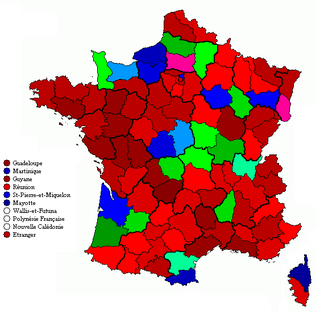
Gaullism is a French political stance based on the thought and action of World War II French Resistance leader Charles de Gaulle, who would become the founding President of the Fifth French Republic. De Gaulle withdrew French forces from the NATO Command Structure, forced the removal of Allied bases from France, as well as initiated France's own independent nuclear deterrent programme. His actions were predicated on the view that France would not be subordinate to other nations.

The Radical Party, officially the Republican, Radical and Radical-Socialist Party, is a liberal and social-liberal political party in France. Since 1971, to prevent confusion with the Radical Party of the Left (PRG), it has also been referred to as Parti radical valoisien, after its headquarters on the rue de Valois. The party's name has been variously abbreviated to PRRRS, Rad, PR and PRV. Founded in 1901, the PR is the oldest active political party in France.

The Radical Party of the Left is a social-liberal political party in France. A party in the Radical tradition, since 1972 the PRG has been a close ally of the major party of the centre-left in France, the Socialist Party. After the 2017 presidential and legislative elections, negotiations to merge the PRG with the Radical Party began and the refounding congress to reunite the parties into the Radical Movement was held on 9 and 10 December 2017. However, a faction of ex-PRG members, including its last president Sylvia Pinel, split from the Radical Movement in February 2019 due to its expected alliance with La République En Marche in the European elections and resurrected the PRG.
Social liberalism is a political philosophy and variety of liberalism that endorses social justice, social services, a mixed economy, and the expansion of civil and political rights, as opposed to classical liberalism which favors limited government and an overall more laissez-faire style of governance. While both are committed to personal freedoms, social liberalism places greater emphasis on the role of government in addressing social inequalities and ensuring public welfare.
Neosocialism was a political faction that existed in France and Belgium during the 1930s and which included several revisionist tendencies in the French Section of the Workers' International (SFIO).

The Unified Socialist Party was a socialist political party in France, founded on April 3, 1960. It was originally led by Édouard Depreux.

Legislative elections were held in France on 12 and 19 March 1978 to elect the sixth National Assembly of the Fifth Republic. On 2 April 1974, President Georges Pompidou died. The non-Gaullist centre-right leader Valéry Giscard d'Estaing was elected to succeed him. Because the Gaullist Union of Democrats for the Republic was the largest party in the pro-Giscard majority in the Assembly, Giscard chose Jacques Chirac to lead the cabinet. This period was one of renovation for Gaullism.
The Gauche Plurielle was a left-wing coalition in France, composed of the Socialist Party, the French Communist Party, the Greens, the Left Radical Party, and the Citizens' Movement. Succeeding Alain Juppé's conservative government, the Plural Left governed France from 1997 to 2002. It was another case of cohabitation between rival parties at the head of the state and of the government. Following the failure of the left in the 2002 legislative election, it was replaced by another conservative government, this time headed by Jean-Pierre Raffarin.
The Rally of Republican Lefts was an electoral alliance during the French Fourth Republic which contested elections from June 1946 to the 1956 French legislative election. It was composed of the Radical Party, the Independent Radicals, the Democratic and Socialist Union of the Resistance (UDSR) and several conservative groups. Headed by Jean-Paul David, founder of the anti-Communist movement Paix et Liberté, it was in fact a right-of-center conservative coalition, which presented candidates to the June 1946, November 1946, and 1951 legislative elections.

The Le Mans Congress was the twenty-first national congress of the French Socialist Party. It took place from November 18 to 20, 2005.
The Reims Congress was the twenty-second national congress of the French Socialist Party, taking place from 14 to 16 November 2008 in the city of Reims in the Marne.

The Sixth French legislative constituency for citizens abroad is one of eleven constituencies each electing one representative of French people living outside France to the National Assembly.
The Ecologists – Europe Ecology The Greens, commonly known as The Ecologists and formerly as Europe Ecology The Greens until 2023, is a centre-left to left-wing green political party in France. The party is a member of the European Green Party. It was formed on 13 November 2010 from the merger of The Greens and Europe Ecology.
The Second Toulouse Congress was the seventy-sixth national congress of the French Socialist Party, the congress was held from October 26 to 28, 2012, in the city of Toulouse in the Haute-Garonne.

The Socialist Party is a centre-left to left-wing political party in France. It holds social democratic and pro-European views. The PS was for decades the largest party of the "French Left" and used to be one of the two major political parties under the Fifth Republic, along with the Rally for the Republic in the late 20th century, and with the Union for a Popular Movement in the early 2000s. It replaced the earlier French Section of the Workers' International (SFIO) in 1969 and is currently led by First Secretary Olivier Faure. The PS is a member of the Party of European Socialists, Progressive Alliance and Socialist International.

The French Socialist Party held a two-round presidential primary to select a candidate for the 2017 presidential election on 22 and 29 January 2017. It was the second open primary held by the center-left coalition, after the primary in 2011 in which François Hollande defeated Martine Aubry to become the Socialist nominee. Hollande went on to defeat incumbent Nicolas Sarkozy in the 2012 presidential election. However, because of his low approval rating, he announced that he would not seek re-election, becoming the first president of the Fifth Republic to decide not to run for a second term. The primary was contested by seven candidates, four from the Socialist Party and three representing other parties part of the left-wing electoral alliance.

The Republican and Socialist Left is a socialist political party in France. It was founded on 3 February 2019 after the merger of the Alternative for a Republican, Ecologist and Socialist Program (APRÉS) and the Citizen and Republican Movement (MRC) of Jean-Luc Laurent and Jean-Pierre Chevènement. APRÉS had been founded in October 2018 by Emmanuel Maurel and Marie-Noëlle Lienemann after their departure from the Socialist Party and was close to La France Insoumise.

The New Ecological and Social People's Union was a left-wing electoral alliance of political parties in France. Formed on May Day 2022, the alliance included La France Insoumise (LFI), the Socialist Party (PS), the French Communist Party (PCF), The Ecologists (LE), Ensemble! (E!), and Génération.s (G.s), and their respective smaller partners. It was the first wide left-wing political alliance since the Plural Left in the 1997 French legislative election. Over 70 dissident candidates who refused the accord still ran.

Centrism in France has played a major role in French politics over many decades. This page presents the parties, political movements and personalities linked to Centrism in France according to their political traditions or their background. The different families of centrism are presented in the different sections.












